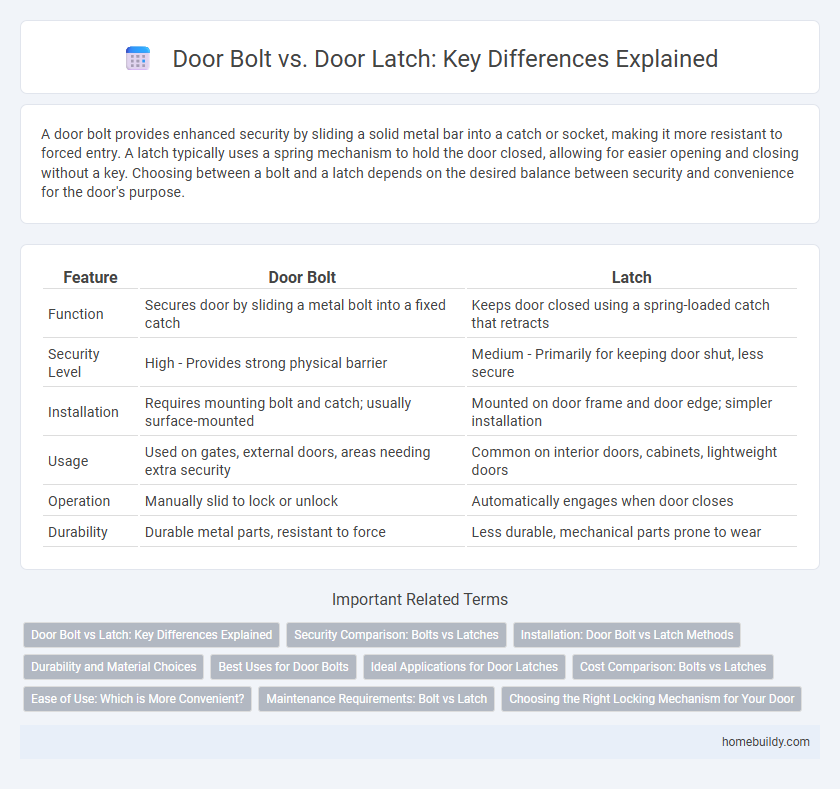A door bolt provides enhanced security by sliding a solid metal bar into a catch or socket, making it more resistant to forced entry. A latch typically uses a spring mechanism to hold the door closed, allowing for easier opening and closing without a key. Choosing between a bolt and a latch depends on the desired balance between security and convenience for the door's purpose.
Table of Comparison
| Feature | Door Bolt | Latch |
|---|---|---|
| Function | Secures door by sliding a metal bolt into a fixed catch | Keeps door closed using a spring-loaded catch that retracts |
| Security Level | High - Provides strong physical barrier | Medium - Primarily for keeping door shut, less secure |
| Installation | Requires mounting bolt and catch; usually surface-mounted | Mounted on door frame and door edge; simpler installation |
| Usage | Used on gates, external doors, areas needing extra security | Common on interior doors, cabinets, lightweight doors |
| Operation | Manually slid to lock or unlock | Automatically engages when door closes |
| Durability | Durable metal parts, resistant to force | Less durable, mechanical parts prone to wear |
Door Bolt vs Latch: Key Differences Explained
A door bolt offers enhanced security by sliding a solid metal bar into a fixed position, effectively reinforcing door strength, whereas a latch uses a spring-loaded mechanism to hold a door closed but can be easier to bypass. Door bolts are typically used as secondary locking devices on gates or doors requiring extra protection, while latches primarily serve to keep doors closed without providing substantial resistance against force. The key difference lies in the door bolt's ability to secure doors firmly in place compared to the latch's function of simply maintaining closure.
Security Comparison: Bolts vs Latches
Door bolts provide superior security compared to latches due to their robust metal construction and deeper engagement into the door frame, making forced entry significantly more difficult. Latches typically rely on spring mechanisms and surface mounting, which can be more easily manipulated or bypassed by intruders. Installing a door bolt enhances protection by offering a stronger physical barrier, especially for exterior doors.
Installation: Door Bolt vs Latch Methods
Door bolt installation typically involves mounting a solid metal bar across the door frame using screws and a strike plate, requiring precise alignment to ensure secure locking. Latch installation often consists of attaching a spring-loaded mechanism with a bolt that fits into a strike plate on the door jamb, allowing for automatic engagement when the door closes. Proper measurement and drilling are essential for both methods to guarantee functionality and durability in securing the door.
Durability and Material Choices
Door bolts offer superior durability compared to latches due to their robust construction, often made from hardened steel or brass, ensuring enhanced security against forced entry. While latches typically use lighter materials like zinc alloy or plastic, door bolts are designed for heavy-duty use, making them ideal for exterior doors that require long-lasting performance. Choosing a door bolt with corrosion-resistant finishes extends lifespan and maintains strength in various environmental conditions.
Best Uses for Door Bolts
Door bolts provide superior security by firmly securing doors in place, making them ideal for external doors, gates, and sliding doors requiring additional reinforcement. Unlike latches, which offer basic closure, door bolts resist forced entry and are best suited for high-security areas or locations prone to strong winds. Their robust design and durable materials ensure long-lasting performance in both residential and commercial applications.
Ideal Applications for Door Latches
Door latches are ideal for applications requiring quick and easy access control, such as interior doors, cabinets, and closet doors. Their design allows for simple engagement and disengagement, making them suitable for areas with frequent use and where security is moderate. Unlike door bolts, latches provide convenience without the need for manual locking, focusing on everyday functionality and user-friendly operation.
Cost Comparison: Bolts vs Latches
Door bolts generally cost more than latches due to their heavier construction and increased security features. While basic latches can range from $5 to $15, door bolts often start around $15 and can exceed $50 for high-security models. Investing in a door bolt enhances safety but requires a higher upfront cost compared to the more affordable and simpler latch mechanisms.
Ease of Use: Which is More Convenient?
Door bolts offer straightforward security by sliding a metal bolt into a catch, providing a firm and reliable lock that is easy to engage and disengage with a simple manual motion. Latches, typically spring-loaded, often require aligning the door correctly for automatic locking, which can be convenient but may pose challenges in misaligned or warped door frames. Overall, door bolts provide a more consistent ease of use due to their mechanical simplicity, while latches offer quicker operation but depend more on door alignment for effective functionality.
Maintenance Requirements: Bolt vs Latch
Door bolts require minimal maintenance, typically involving occasional lubrication to ensure smooth operation and prevent rust. Latches, especially spring-loaded models, demand more frequent inspection and cleaning to avoid jamming and wear in the spring mechanism. Proper upkeep of door bolts generally extends their lifespan compared to latches, which may need regular adjustments or component replacements.
Choosing the Right Locking Mechanism for Your Door
A door bolt offers a more secure locking mechanism compared to a latch, as it extends deeper into the door frame, providing enhanced resistance against forced entry. Latches are easier to operate and ideal for interior doors where convenience is prioritized over security. Choosing between a door bolt and a latch depends on the required security level, door type, and usage frequency.
Door bolt vs latch Infographic

 homebuildy.com
homebuildy.com